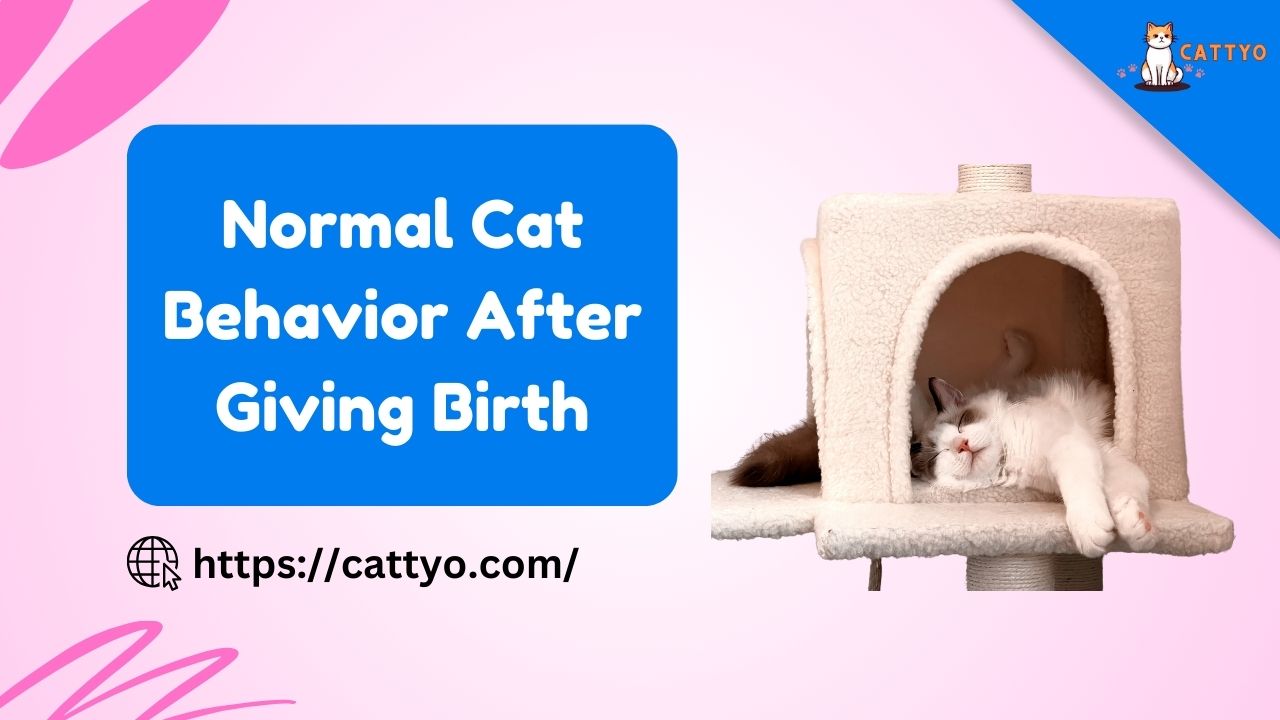So, your cat just gave birth. Congratulations—you’re officially a cat-grandparent! But now you’re probably wondering: what’s normal behavior after a cat has kittens?
Is she acting like a supermom or acting like she wants to hide under the couch for a month?
The truth is, both can happen. New mothers (whether they’re human or feline) often swing between feelings of pride and sheer exhaustion.
Let’s dig into what’s typical behavior-wise, what might raise some red flags, and how to support your feline friend as she navigates motherhood.
Normal Cat Behavior After Giving Birth!
After giving birth, a cat will display behaviors such as nursing her kittens, grooming them, and ensuring their safety. She may be more vocal, slightly protective, and may initially eat less.
Resting and recovering are common, but she will stay attentive to her kittens. Watch for signs of complications like excessive restlessness or lack of interest in the kittens. Creating a calm, quiet space for her to recover is essential. Now let’s check the Normal Cat Behavior After Giving Birth in below
- Nursing: The mother will nurse her kittens frequently.
- Grooming: She will groom her kittens to keep them clean and stimulate their circulation.
- Protectiveness: Expect increased protectiveness and defensive behavior around her kittens.
- Vocalization: She may be more vocal, communicating with her kittens or expressing discomfort.
- Resting: The mother cat will spend more time resting and recovering.
- Decreased Appetite: She may eat less initially, but appetite should return as she recovers.
- Attention to Kittens: The mother will remain attentive, keeping her kittens close and safe.
- Isolation: She may prefer a quiet, secluded area to care for her kittens.
- Behavioral Changes: Look for signs of discomfort, stress, or infection if she shows unusual behavior.
- Watch for Complications: Monitor for signs of difficulty, such as not nursing or lack of interest in kittens.
The First 24 Hours: A Rollercoaster of Emotions (and Hormones)
Alright, so your cat just gave birth. She’s probably exhausted, maybe a little confused, and definitely a little wobbly.
This is totally normal. Cats, much like people, need some time to adjust to the whole “I’m a mom now” thing. You’ll likely notice a few different behaviors right off the bat.
Resting and Bonding
For the first few hours, your cat will likely remain very still, often curled up with her newborn kittens. She’ll be licking them—licking is her way of cleaning them, yes, but also stimulating them to breathe and move around. It’s instinctual.
If she seems overly protective of them and refuses to leave their side, that’s her natural maternal instinct kicking in.
You might even see her purring, which is a sign she feels secure and relaxed. In a sense, she’s in “mom mode,” and she’s focused entirely on her new family.
The Hunger Games: Round 1
After delivering the kittens, mama cat is going to be starving. Seriously, the woman just went through hours of labor. She might be ravenous and gulp down food like she’s never seen a bowl before.
Be sure to offer her some high-quality cat food, especially if she’s nursing, to help her regain her strength.
If she turns her nose up at it, don’t panic—it’s common for cats to experience a dip in appetite after labor due to all the hormones flooding her system.
The Week After: Taking Care of Business (and Kittens)
Once the initial shock of giving birth wears off, mama cat will slip into more of a routine. This period can last anywhere from a few days to a week, depending on how comfortable and secure she feels in her environment.
Grooming: All Day, Every Day
Expect your cat to be obsessively grooming herself and her kittens. She’ll lick them clean after every feeding and might even groom them just to soothe them.
While it might seem like a lot of licking, it’s an important bonding activity. And yes, mama cats do sometimes get a little too intense with the licking, which can make the kittens squirm in protest. But hey, they’ll get used to it.
Keeping a Watchful Eye
If you’ve noticed your cat being unusually alert or even a little bit defensive of her space, it’s totally normal. She’s probably still getting the lay of the land as a mom.
Some cats can get a little grumpy or territorial when they’re in the process of motherhood, especially in the early days.
If your cat hisses at you or seems unwilling to let you near her kittens, don’t take it personally. She’s just in full-on protection mode, making sure her babies stay safe.
Normal, But Sometimes Quirky: What Might Seem Weird But Is Actually Fine
Okay, so here’s the thing: cats are weird, even more so when they’ve had kittens. Some behaviors might raise eyebrows, but they’re still considered normal.
The “I’m a Lone Wolf” Phase
You might notice that mama cat sometimes takes off for a few hours, leaving the kittens behind. Is she abandoning them? Nope! Sometimes, new mothers just need a break.
They might go for a walk around the house or hide in a corner for some much-needed alone time. Just make sure the kittens are warm, fed, and safe, and don’t worry if mama cat isn’t always with them. She’ll return when she’s ready.
Purring and Kneading
Purring? Definitely normal. Kneading her kittens with her paws? Also normal, but a little quirky. It’s a behavior she carried over from kittenhood.
As kittens, they kneaded their mom’s belly to stimulate milk flow, and that instinct sticks with them throughout their lives. When mama cat kneads her kittens, it’s not only soothing to her; it’s a way to bond with them.
Hunting and Bringing You “Gifts”
Here’s a fun one: don’t be surprised if your newly-minted mama cat decides to bring you a “gift” in the form of a dead mouse or bird, even though she’s got a whole new family to take care of.
It’s not a sign of abandonment or that she’s neglecting her kittens; rather, it’s just her instincts at work.
Cats are natural hunters, and while she’s not necessarily going to hunt for food for her kittens, she might be bringing you prey to show off her hunting prowess. It’s weird, but hey, it’s cats being cats.
Table: Quick Guide to Cat Postpartum Behavior
| Behavior | Is It Normal? | What It Means |
|---|---|---|
| Resting and bonding with kittens | Yes | She’s recovering from birth and bonding with her new family. |
| Excessive grooming | Yes (but maybe a little much) | She’s cleaning herself and the kittens, and it’s part of her natural instincts. |
| Protectiveness/defensiveness | Yes | She’s ensuring her kittens are safe and secure. Don’t take it personally! |
| Lack of appetite initially | Yes | Hormonal changes and exhaustion might reduce her appetite temporarily. |
| Leaving the kittens briefly | Yes | She needs breaks, but she’ll always return to her babies. |
| Hunting and bringing gifts | Yes (a little odd) | She’s showing off her hunting skills, not neglecting her kittens. |
FAQs About Cat Behavior After Giving Birth
1. How long should I leave mama cat alone after she gives birth?
It’s generally best to leave her alone for the first few hours to allow her to bond with her kittens. After that, you can check in on her, but keep your distance. She may need a little space from humans as she gets used to her new role.
2. What if mama cat seems to be ignoring her kittens?
If she’s not paying attention to her kittens, it could be a sign of a problem, like stress or illness. Monitor her closely. If she’s not feeding or cleaning them, or if she seems lethargic, it’s time to call a vet.
3. How can I help mama cat during this time?
Provide a quiet, comfortable space for her and the kittens. Make sure she has access to fresh food and water, and keep the area clean. Avoid stressing her out with loud noises or a lot of visitors. Most importantly, give her the space to bond with her kittens.
4. When should I start looking for homes for the kittens?
Kittens stay with mama cat for the first 8-10 weeks, so you’ll have time to figure out adoption or rehoming. During this time, you can begin socializing them if you’re planning to place them in new homes.
Final Tip
Anyway, your cat is being the chillest mom or the most overprotective, her behavior after giving birth is generally a mix of instinct and adaptation.
From grooming to the occasional “disappearing act,” it’s all part of the package deal. Remember, every cat is different, and some quirks are completely normal.
Keep an eye on her, provide her with love and support, and let her do her thing. In the end, she’ll thank you for it with those little purrs and nudges from her tiny kittens.





